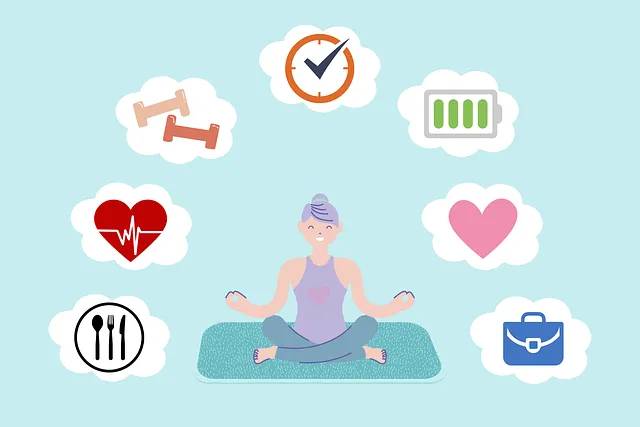In Northglenn, where Kaiser offers both inpatient and outpatient mental health services, accessible self-assessment tools are crucial for early mental health management. Interactive online assessments guide users with tailored self-care practices, empowering individuals to handle stress even without local inpatient care. Kaiser's comprehensive framework includes risk assessment tools and crisis hotlines, showcasing their leadership in mental wellness. However, challenges like stigma and healthcare provider burnout necessitate community-specific solutions, such as the Stress Management Workshops Organization (SMWO). To create effective self-assessment tools for Northglenn residents, a structured approach involving diverse user feedback and regular updates ensures cultural sensitivity and continuous improvement, fostering mental health awareness and resilience.
Mental wellness self-assessment tools play a pivotal role in enhancing access to care and personal growth. This article delves into the development of such tools, focusing on Northglenn’s community. We explore the growing need for accessible resources, examining what organizations like Kaiser offer in terms of inpatient mental health programs. By identifying gaps, we highlight challenges faced and propose innovative solutions tailored to local needs. Effective self-assessment tools are designed, emphasizing implementation strategies for optimal impact. Learn how these initiatives can revolutionize mental health support in Northglenn and beyond, building on existing resources like those provided by Kaiser.
- Understanding the Need for Self-Assessment Tools in Mental Health Care
- Exploring Existing Resources: What Does Kaiser Offer?
- Identifying Gaps and Challenges in Current Inpatient Mental Health Programs
- Designing Effective Self-Assessment Tools for Northglenn's Community
- Implementation, Testing, and Continuous Improvement Strategies
Understanding the Need for Self-Assessment Tools in Mental Health Care

In today’s fast-paced world, where mental health issues are becoming increasingly prevalent, there is a growing need for accessible and effective self-assessment tools. These tools play a crucial role in empowering individuals to take charge of their mental wellness. The importance of such initiatives is especially notable in communities like Northglenn, where Kaiser may not offer inpatient mental health services, leaving residents with limited options for immediate care. Self-assessment tools can help identify early signs of distress or emerging mental health challenges, enabling prompt intervention and support.
By promoting self-care practices, these resources empower individuals to manage stress effectively through organized workshops and programs. For instance, a Stress Management Workshops Organization could develop an interactive online assessment that guides users through various self-care practices, including depression prevention strategies, to enhance overall mental wellness. This proactive approach ensures that individuals can access tools and resources tailored to their needs, even without traditional inpatient care options available in their area.
Exploring Existing Resources: What Does Kaiser Offer?

In Northglenn, Kaiser offers a comprehensive range of mental health services, including both outpatient and inpatient care options. Their commitment to mental wellness is evident through various resources and programs designed to support individuals across different stages of life and with diverse needs. For those seeking crisis intervention, Kaiser provides specialized guidance and immediate assistance through their emergency departments and dedicated hotlines, ensuring swift support during mental health crises.
Beyond inpatient care, Kaiser’s portfolio includes extensive online tools and educational resources aimed at fostering Mental Health Awareness. They offer risk assessment tools for mental health professionals to aid in early identification of potential risks among patients. By leveraging these existing resources, Kaiser demonstrates its role as a leader in promoting mental wellness, providing not only treatment but also valuable insights and strategies for both individuals and professionals alike.
Identifying Gaps and Challenges in Current Inpatient Mental Health Programs

Inpatient mental health programs play a pivotal role in providing critical care for individuals grappling with severe mental illness. However, a closer look at existing services, particularly at Kaiser in Northglenn, reveals gaps and challenges that hinder optimal patient outcomes. One prominent issue is the persistent mental illness stigma, which can discourage individuals from seeking help or lead to suboptimal treatment plans. This stigma reduction effort is essential for fostering an environment where mental health is prioritized and treated with the same urgency as physical health.
Moreover, healthcare providers within these programs often face challenges related to burnout prevention. Long working hours, high caseloads, and complex patient needs can contribute to caregiver fatigue, compromising the quality of care. Developing comprehensive self-assessment tools that cater to both patients’ needs and provider wellness is crucial for addressing these issues effectively, ultimately enhancing mental health awareness and improving treatment outcomes.
Designing Effective Self-Assessment Tools for Northglenn's Community

In Northglenn, there’s a growing recognition of the importance of mental wellness, and this has led to efforts to develop effective self-assessment tools tailored to the community’s unique needs. Given that Kaiser in Northglenn offers inpatient mental health services, it’s crucial that local resources complement these established healthcare options with preventive and proactive measures. One such initiative is the Stress Management Workshops Organization (SMWO), which aims to empower residents through knowledge and practice of stress management techniques, including Mindfulness Meditation.
These workshops, coupled with a Mental Wellness Journaling Exercise guided by professionals, can help individuals track their emotional well-being over time. By combining practical activities like meditation with introspective exercises like journaling, Northglenn’s community members gain valuable tools to maintain their mental health. This proactive approach not only enhances individual resilience but also reduces the burden on inpatient services, ensuring a healthier and more balanced community overall, including those who might benefit from Kaiser’s specialized care.
Implementation, Testing, and Continuous Improvement Strategies

In developing mental wellness self-assessment tools for a community like Northglenn where Kaiser offers inpatient mental health services, a structured and systematic approach is paramount. Implementation begins with pilot testing among diverse groups to ensure cultural sensitivity and usability. This phase also includes gathering user feedback from individuals who represent various demographics and those who have used similar tools before. The data collected provides insights into the tool’s effectiveness, any technical glitches, and areas for improvement.
Continuous improvement strategies are then put in place, incorporating the Crisis Intervention Guidance recommended by healthcare professionals. Regular updates to the self-assessment tools can include enhanced Resilience Building components based on user feedback and emerging research. Moreover, integrating Mental Health Education Programs Design principles ensures that not only is the tool assessment but also educates users about mental health maintenance and resources available within the community, such as Kaiser’s inpatient services in Northglenn.
The development of robust mental wellness self-assessment tools is a key step towards enhancing access to care in Northglenn’s community. By examining existing resources, such as those offered by Kaiser’s inpatient mental health programs, it becomes evident that there is room for improvement. Identifying gaps and challenges in current practices has been instrumental in designing effective assessment tools tailored to the local community’s needs. Through successful implementation, testing, and continuous improvement strategies, these tools can revolutionize mental health self-assessment, ensuring better outcomes for those seeking support.






